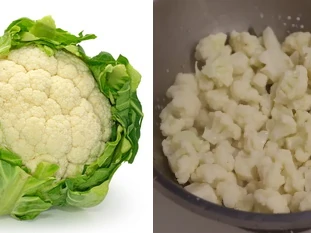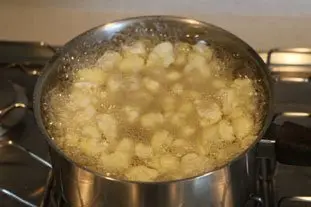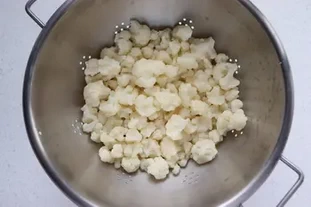Cooking cauliflower

Dramatic observation: cauliflower when cooked has a bad reputation ("it doesn't smell good!" and the like), and yet it's an excellent vegetable, very Breton, that deserves to be treated well, to give the best of itself.
12 K 3.3/5 (11 reviews)
Keywords for this post:CabbageCauliflowerCookingSmellFreshnessLast modified on: August 29th 2023
Cooking cauliflower
The main complaint is that it smells strong when cooked, and it's true that if you're not careful, you can smell around the house that you've cooked cauliflower!
Why this persistent smell? Because, as it cooks, cauliflower ends up developing sulphur compounds, which are unfortunately very odorous.
But this reaction and its odors only occur late in the cooking process, in other words, it's mainly the result of cooking too long. If you cook just long enough, you won't get any unpleasant odors.
These odors are also accentuated by the loss of freshness of cauliflower, i.e. the fresher it is, the less odorous it will be when cooked (for a short time).
1) Use the freshest cauliflower possible: the fresher it is, the less fragrant it will be. Don't leave it lying around in the refrigerator crisper. Cook it the same day, or the next day if possible.
2) Cook for as short a time as possible: When you prepare your cauliflower, cut it into small, even-sized pieces (they cook faster and more evenly).
If you're cooking "à l'anglaise" in boiling salted water, keep a close eye on the cooking process, and test it by sticking a knife blade into a piece of cauliflower. If it goes through easily, the cabbage is cooked, so take it out of the water immediately, and if you can't eat it straight away, refresh it under very cold water.
3) Even if you immediately think of cooking cauliflower in boiling salted water, this isn't the only possible method. Cauliflower can, for example, be cooked in milk, steamed or baked.
Oh yes, it's delicious raw too, so you can grate it to make an amazing cauliflower tabbouleh, or thinly slice it for salads or a crunchy cauliflower with lemon.
To sum up: to cook cauliflower optimally, use the freshest cauliflower possible, and cook it as short as possible.
Why this persistent smell? Because, as it cooks, cauliflower ends up developing sulphur compounds, which are unfortunately very odorous.
But this reaction and its odors only occur late in the cooking process, in other words, it's mainly the result of cooking too long. If you cook just long enough, you won't get any unpleasant odors.
These odors are also accentuated by the loss of freshness of cauliflower, i.e. the fresher it is, the less odorous it will be when cooked (for a short time).
What are the best ways to cook cauliflower?
1) Use the freshest cauliflower possible: the fresher it is, the less fragrant it will be. Don't leave it lying around in the refrigerator crisper. Cook it the same day, or the next day if possible.
2) Cook for as short a time as possible: When you prepare your cauliflower, cut it into small, even-sized pieces (they cook faster and more evenly).
If you're cooking "à l'anglaise" in boiling salted water, keep a close eye on the cooking process, and test it by sticking a knife blade into a piece of cauliflower. If it goes through easily, the cabbage is cooked, so take it out of the water immediately, and if you can't eat it straight away, refresh it under very cold water.


3) Even if you immediately think of cooking cauliflower in boiling salted water, this isn't the only possible method. Cauliflower can, for example, be cooked in milk, steamed or baked.

Is raw cauliflower possible?
Oh yes, it's delicious raw too, so you can grate it to make an amazing cauliflower tabbouleh, or thinly slice it for salads or a crunchy cauliflower with lemon.
To sum up: to cook cauliflower optimally, use the freshest cauliflower possible, and cook it as short as possible.
Lasts posts
XO Cognac Explained: Meaning, Aging, and Flavor Profile
XO Cognac always goes beyond the labels on the bottle: it is often associated with tradition and quality. You get to appreciate the artistry, character and ageing process when you understand what defines this smooth Cognac. The section below tackles everything about XO Cognac, from complex flavour...January 28th 20261,002 Sponsored article
Butter vs. grease
We often read in a recipe where a pastry is put into a mould that, just before pouring, the mould should be buttered or greased. But what's the difference between these 2 terms?December 1st 20252,6455
Getting out of the fridge early
Very often when you're cooking, you need to take food or preparations out of the fridge, to use them in the recipe in progress. There's nothing tricky about this: you just take them out of the fridge and use them, usually immediately, in the recipe. But is this really a good method?November 24th 20251,6995
Who's making the croissants?
When you look at a bakery from the outside, you naturally think that in the bakery, the bakers make the bread, and in the laboratory, the pastry chefs make the cakes. It's very often like that, with each of these professions having quite different ways of working, but sometimes there's also one...November 23th 20251,551
Oven height
When we put a dish or cake in the oven, we naturally tend to put it on the middle shelf, and that's what we usually do. But in some cases, this position and height can be a little tricky, so let's find out why.October 8th 20255,2155
Other pages you may also like
When I was a kid, I didn't like...
Maybe you've already made this strange observation: when you were a kid, there were things you hated, but as an adult it's almost the opposite? For example, you used to hate spinach or chicory, but now you love it?November 5th 202311 K5
Cutting soft cheeses
As you may have already noticed, when you have to use a "soft" cheese in a recipe - their exact name is "soft cheese" - such as Camembert, Munster or Mont d'or, it's not easy to make anything other than thick slices.February 20th 20249,9465
Raising (or leavening) agents
When we want to make a dough or batter rise when baking, either in patisserie or bread-making, we need to use a raising agent or leavening agent, one of which is called leaven. In the context of baking, a raising agent is simply what "makes something rise". It is a substance which, when added to...June 16th 202158 K4.8
The 3 essential knives
You must have heard a chef or cook say: "There’s no good cooking without good ingredients". This is very true, of course, but for any amateur or beginner it is equipment that really counts to start with. What I mean is that you should not skimp on kitchen equipment, good utensils, a food...May 30th 201825 K5
In praise of Mont d'Or cheese
Do you know the Mont d'Or, this extraordinary cheese from the Haut-Doubs in France, with a unique taste and appearance, which can be eaten both raw and cooked? I'll tell you a few words about it, and with some tips on how to choose it and cook it. .November 27th 202113 K5
Post a comment or question
Follow this page
If you are interested in this page, you can "follow" it, by entering your email address here. You will then receive a notification immediately each time the page is modified or a new comment is added. Please note that you will need to confirm this following.
Note: We'll never share your e-mail address with anyone else.
Alternatively: you can subscribe to the mailing list of cooling-ez.com , you will receive a e-mail for each new recipe published on the site.









